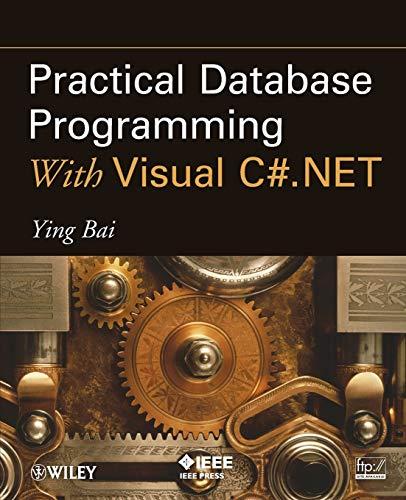Answered step by step
Verified Expert Solution
Question
1 Approved Answer
#include template class DList{ struct Node{ T data_; Node* next_; Node* prev_; Node(const T& data=T{},Node* next=nullptr, Node* prev=nullptr){ data_=data; next_=next; prev_=prev; } }; Node* front_;
| #include | |
| template | |
| class DList{ | |
| struct Node{ | |
| T data_; | |
| Node* next_; | |
| Node* prev_; | |
| Node(const T& data=T{},Node* next=nullptr, Node* prev=nullptr){ | |
| data_=data; | |
| next_=next; | |
| prev_=prev; | |
| } | |
| }; | |
| Node* front_; | |
| Node* back_; | |
| public: | |
| DList(){ | |
| front_=nullptr; | |
| back_=nullptr; | |
| } | |
| void push_front(const T& data); | |
| ~DList(); | |
| class const_iterator{ | |
| Node* curr_; | |
| const_iterator(Node* n){ | |
| curr_=n; | |
| } | |
| public: | |
| const_iterator(){ | |
| curr_=nullptr; | |
| } | |
| const_iterator& operator++(){} | |
| const_iterator operator++(int){} | |
| const_iterator& operator--(){} | |
| const_iterator operator--(int){} | |
| bool operator==(const_iterator rhs){} | |
| bool operator!=(const_iterator rhs){} | |
| const T& operator*()const{} | |
| }; | |
| class iterator:public const_iterator{ | |
| public: | |
| iterator(); | |
| iterator& operator++(){} | |
| iterator operator++(int){} | |
| iterator& operator--(){} | |
| iterator operator--(int){} | |
| T& operator*(){} | |
| const T& operator*()const{} | |
| }; | |
| const_iterator cbegin() const{ } | |
| iterator begin(){ } | |
| const_iterator cend() const{} | |
| iterator end(){} | |
| }; | |
| template | |
| void DList | |
| **YOUR CODE** | |
| } | |
| template | |
| DList | |
| **YOUR CODE** | |
| } | |
| template | |
| class Sentinel{ | |
| struct Node{ | |
| T data_; | |
| Node* next_; | |
| Node* prev_; | |
| Node(const T& data=T{},Node* next=nullptr, Node* prev=nullptr){ | |
| data_=data; | |
| next_=next; | |
| prev_=prev; | |
| } | |
| }; | |
| Node* front_; | |
| Node* back_; | |
| public: | |
| Sentinel(){ | |
| front_=new Node(); | |
| back_=new Node(); | |
| front_->next_=back_; | |
| back_->prev_=front_; | |
| } | |
| void push_front(const T& data); | |
| ~Sentinel(); | |
| class const_iterator{ | |
| public: | |
| const_iterator(){} | |
| const_iterator& operator++(){} | |
| const_iterator operator++(int){} | |
| const_iterator& operator--(){} | |
| const_iterator operator--(int){} | |
| bool operator==(const_iterator rhs){} | |
| bool operator!=(const_iterator rhs){} | |
| const T& operator*()const{} | |
| }; | |
| class iterator:public const_iterator{ | |
| public: | |
| iterator(); | |
| iterator& operator++(){} | |
| iterator operator++(int){} | |
| iterator& operator--(){} | |
| iterator operator--(int){} | |
| T& operator*(){} | |
| const T& operator*()const{} | |
| }; | |
| const_iterator cbegin() const{} | |
| iterator begin(){} | |
| const_iterator cend() const{} | |
| iterator end(){} | |
| }; | |
| template | |
| void Sentinel | |
| **YOUR CODE** | |
| } | |
| template | |
| Sentinel | |
| **YOUR CODE** | |
| } |
To support this add the following functions to each of DList and Sentinel classes:
iterator begin(); const_iterator cbegin() const;
These functions returns an iterator/const_iterator to the first node in the list, end() if list is empty.
iterator end(); const_iterator cend() const;
these functions returns an iterator/const_iterator to the node just after the last node in the linked list.
Please implement iterator and const_iterator for functions DList and Sentinel classes in C++ code language, thank you!
Step by Step Solution
There are 3 Steps involved in it
Step: 1

Get Instant Access to Expert-Tailored Solutions
See step-by-step solutions with expert insights and AI powered tools for academic success
Step: 2

Step: 3

Ace Your Homework with AI
Get the answers you need in no time with our AI-driven, step-by-step assistance
Get Started


